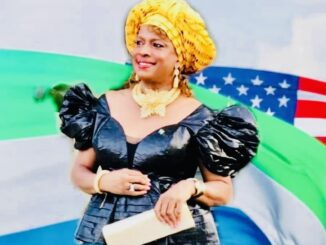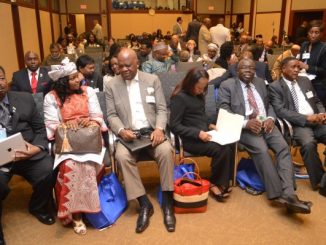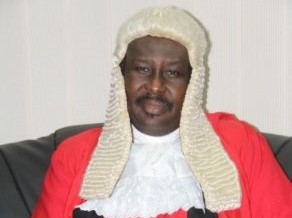By KABS KANU AND PASCO TEMPLE :
Thunderous cheers reverberated through the World Bank Conference Hall in Washington DC this morning when Sierra Leone’s President Dr. Ernest Bai Koroma addressed the Ronald H. Brown African Affairs Town Hall Meeting on Africa organized by the Constituency For Africa (CFA ). President Koroma addressed the meeting by video from State House and his statement was received with acclaim and continuous applause as he touched on matters that were very educative and inspiring on the diaspora’s capacity to sustain Africa’s ongoing renaissance.
WE BRING YOU THE FULL STATEMENT :
PRESIDENT ERNEST KOROMA GIVING HIS ADDRESS WHICH DREW CHEERS FROM THE HALL
Lecture by His Excellency the President of Sierra Leone, Dr. Ernest Bai Koroma on
“Harnessing the African Diaspora in Building Capacity in Africa”.
Washington DC [September 17th 2013] – by Video Link
It is a great honor for me to speak on how we can harness the African Diaspora for African development.
The Diaspora is pivotal to the sustainability of the ongoing renaissance of Africa, and we thank the Constituency for Africa and the World Bank for organizing this most relevant meeting.
Topics relating to the Diaspora are dear to us, for the African Diaspora was very integral to the emergence of my country Sierra Leone, and our neighbor Liberia. Sierra Leone was for centuries known as the Rice Coast, and Bunce Island in my country was for decades a major fort and port for slavers who forcibly took hundreds of thousands of our people to the rice growing areas of Georgia and other states in the South of the United States. John Newton, the slaver turned evangelist had his inspiration for composing Christendom’s most famous hymn, Amazing Grace, on the shores of our land. And it was indeed amazing that the dream of the return of the African Diaspora to the African homeland got to be actualised with grace when neighboring Liberia, and my own country Sierra Leone, where so many thousands were shipped out to the United States, were to play historic roles in this display of the resilience of humanity. But it was not only a question of return, it was also about the forging of links between this Diaspora and those within the continent in ways that would enhance free enterprise, trade, education and divine values. These were the ideas that led to the founding of our capital city Freetown in 1789.
THE LARGE ATTENDANCE AT THE HALL : THE PRESIDENTIAL DELEGATION TO WASHINGTON DC IN THE FRONT ROW–FROM RIGHT : HON. ALPHA KANU; AMBASSADOR STEVENS ; HON. MABINTI DARAMY; AMBASSADOR CONTEH ; HON. ISATA KABIA AND MINISTER PLENIPOTENTIARY KABS KANU FROM THE UN MISSION IN NEW YORK
Our city grew; the idea thrived for a while, and our brothers and sisters from the Diaspora and their descendants were at the center of growth, education, and innovations throughout the West African Coast. The Diaspora returnees to the continent and their descendants were pivotal in the founding of Fourah Bay College in Freetown, the oldest western style university in sub Saharan Africa, the establishment of the continent’s first secondary schools, and for building a community renowned for its advocacy for equality, justice, political and civil rights. But the scramble for Africa in the 1880s put enormous strains on the idea and actualization of return of people of African descent to the continent. That scramble was an inglorious race amongst non-Africans for the resources of Africa. The continent was carved up amongst European powers; political and economic marginalization, and a divide and rule policy by the colonialists prevented the optimizations of synergies between the Diaspora returnees to Sierra Leone and their compatriots. But the resilience of the Diaspora returnees hardly waned. They moved all over West Africa, spreading knowledge, establishing centers of worship, founding newspapers, starting thriving businesses and forming alliances all over territories in the Gulf of Guinea to end colonial rule.
PART OF THE CROWD AT THE TOWN MEETING
Too many events have been played out since that time. Africa regained its independence; but our economies stagnated. Economic exploitation of the continent, mainly by non-Africans, and political repression of the people, mainly by their own very leaders created too many realms of deprivation in the continent.
But the 21st Century has brought in its wake a new beginning for the cradle of mankind. Within 10-20 years, Africa’s annual production value will be between USD 1.5 and 2.0 trillion. The region has 80-90% of the world’s chromium and platinum group metals, 10% of its oil reserves of oil and 40% of its gold. Our continent also has some of the earth’s largest deposits of iron ore, uranium and copper.
DR. SYLVIA BLYDEN –ANOTHER MEMBER OF THE PRESIDENTIAL DELEGATION-ACKNOWLEDGES THE CHEERS FOR PRESIDENT KOROMA
Our common fatherland has approximately 600 million hectares of arable land suitable for cultivation, of which 15% of this land is developed. Per capita water resource is 4,600 square meters, and this is more than that in Asia.
AMBASSADOR BOCKARIE STEVENS ON THE PODIUM DURING THE PROGRAM
The African story however, is not only about natural resources. A great revival is taking place in our telecommunications, retail, finance and other sectors. More Africans are having more disposable incomes, the middle class is expanding, more than 60 million Africans have an income of $3,000 a year and this is increasing to more than 100 million Africans in a couple of years. The Africa Development Bank now reports that over 350 million Africans, a third of the continent’s population, are in the middle class.
MEMBERS OF THE DELEGATION : FROM RIGHT –MR. FODAY MANSARAY, HON. ISATA KABIA AND MINISTER KABS-KANU
There are still many challenges in the continent. We are faced with huge infrastructure deficits and an image in the media, particularly in the West that is fixated on depicting Africa as a continent of conflicts and natural disasters. This image is definitely not the narrative of Africa today. More than 90% of countries in Africa have stable democratic regimes at peace with themselves and their neighbors. There are fewer armed conflicts now in Africa than ever before, and we are taking the lead in ensuring quicker return to stability in countries affected by armed conflict through more robust frameworks designed and implemented by the African Union, ECOWAS, and other regional organizations in the continent.
Democracy, political and economic stability are taking roots in the continent. Our economies are becoming more open, our societies more tolerant, and our budgets more balanced. Our debt burdens have declined and we are reducing rates of inflation all over the continent. The results are greater growth rates than ever before. Six of the world’s ten fastest growing economies are in Africa, one of which is my country Sierra Leone. Foreign Direct investments in the continent have increased more than six folds since 2007; and more than in almost all other regions of the world, we have better rates of return for enterprises that are establishing new marketing networks, new brands and innovative products.
Africa’s doing business rankings, transparency indicators and the number of companies in the race to invest in the continent are increasing. All over the continent it is becoming easier to register businesses; tax systems are becoming clearer, investment protection laws stronger, and fiscal management more prudent
Whilst there are some remaining challenges, we are, in Sierra Leone, as in many other countries in the continent, moving on to ensuring international best practices in our mineral acts and providing fiscal incentives for enterprises in mining, infrastructure, agribusiness, tourism, value addition and renewable energy.
Africa is the new frontier for economic growth and investment. The return of the Diaspora is once again taking root, and a new race for Africa is on again. It is a race for land, a race for petroleum resources, a race for iron ore, uranium, and for the consumer markets of the continent. But this time around we should not allow the race to degenerate into a scramble, we should not allow this race to lead to despoliation, authoritarianism and new forms of enslavement. More importantly, we should not allow this race to kill the noble idea of the return of the African Diaspora.
The other group of Africans in the Diaspora are more recent migrants to Europe, the Americas and in the last few decades to Australia and East Asia, particularly China. Many of these migrants are amongst the most skilled and energetic of our people, and their emigration brought about enormous brain loss and skills gaps in many critical areas of our societies. They often moved out to seek better opportunities, but most of them have often thought of their emigration as temporary, and that they would one day return to the continent with better skills and greater resources to uplift their families, communities and nations. In essence, we may have, on balance, brain gain, more skills and resources for the African Community. But for this overall brain gain to register in the lives of the people of our continent, the idea and actualization of return must be kept alive, must be sustained and must be synergized.
But we have remained unbowed; and today an African renaissance is underway. We are the worthiest place for investment in the world; our consumer markets are growing; and the consciousness of return and the synergies for growth, dignity and freedom that this return could bring about are more robust.
The African Diaspora has been pivotal in advocating for policies and actions beneficial to African peoples. During the armed conflict in Sierra Leone in the 1990s, the Diaspora was key in mobilizing support for peace and justice in our country. The African-American community in the United States—through the Congressional Black Caucus, the Constituency for Africa, Trans-Africa and the Diaspora African Women’s Network—has been instrumental in lobbying for American legislation that benefits African countries.
But these remittances and investments, these transfers of skills, these advocacy for the continent need to be greatly structured and deepened to ensure optimal relevance to the social, political and economic renaissance of Africa and the African Diaspora.
We may need to map out the African Diaspora and create databases that capture the varying demographics, skills and other relevant statistics for effective designing and implementation of policies relating to the African Diaspora.
We may also want to look into the creation of a Pan-African Diaspora Commission charged with the responsibility of designing continent and Diaspora wide frameworks, engagement policies, programs and projects. The African Union has commenced the process; we may therefore need to further engage the Union with a view to publicizing and mobilizing the necessary financial, human and logistical resources to ensure success. We may, in view of this, want to create a Volunteer Diaspora Corps, similar to what we have in the Peace Corps, to design organize and implement schemes for Diaspora volunteering, transfer of skills, and experience sharing.
We may also need to institute combinations of initiatives that amongst others, lower the costs of transactions between Africa and its Diaspora, and aggregate Diaspora remittances and investments for optimal impact. This could be done, for example through preferential duty waivers and other concessions for Diaspora businesses; extension of formal banking opportunities and cheaper costs for financial transfers of members of the Diaspora, and the issuance of Diaspora bonds by African Governments. It is estimated that African Governments could raise billions of dollars annually through Diaspora bonds for development programs in the continent. Kenya and Ethiopia have already commenced the issuance of Diaspora bonds.
With growing competition in the African banking sector, we may also want to design policies that encourage commercial banks to expand their business to the Diaspora population by sourcing deposits from them and offering them mortgages and other services. A few banks have started the process. Expanding and strengthening these initiatives may allow the diaspora to hold money in local African banks, which gives the banks the ability to mobilize deposits for loans to the private sector for development.
We may also need to encourage the growth of private sector networks as effective means of establishing links to the diaspora. These may include investments in capital markets and modern communications technology, the establishment of investment funds, the creation of social media, and generation of literature, games and other cultural products that are informed by the memories and aspirations of our people.
Heritage tourism will be a particularly educative and inspirational experience for people of African descent and all those committed to saying never again the horrors of slavery, convict lease, share-cropping or bonded labour; heritage tourism will spread the word about the resilience of people of African descent, the assertions of our humanity and will to happiness, the magnificence of our creations and the nobility of our collective aspirations. Heritage tourism is about visits and experiencing of sites in Africa and here in the Americas that are an integral part of the collective African heritage. The sites may include Gullah creations in Georgia, sacred sites of Africans in Brazil, the Caribbean and here in the United States; they include the chain of forts along West Africa, from Goree Island in Senegal to Bunce Island in Sierra Leone, Elmina Castle in Ghana and similar historic sites in Nigeria. They include sites of resistance in Southern Africa, the great walls of Zimbabwe, the historic buildings of Zanzibar, the game reserves of East Africa, the Churches of Ethiopia, the Mosques of Timbuktu, and more recent creations by people of African descent. We may need to create tourism companies dedicated to enhancing pan African memories and experiences, and to teaching the world about the trials, the resilience and achievements of our people.
Distinguished ladies and gentlemen, Africa is on the move, and people of African descent, wherever they are, must be part of this revival. Harnessing the African Diaspora in building capacity in Africa is the only way we can sustain our revival. Harnessing the African Diaspora in building capacity in Africa is the only way we can give practical relevance to the narrative of our common ancestry, our historic resilience, and our aspirations for a better world through a better Africa, an Africa that is strong, democratic, prosperous and a greater light on the peoples of the world.
I thank you for your attention.
© 2013, COCORIOKO. All rights reserved. – Discuss this and other related articles on the Salone Forum










No comments yet… Be the first to leave a reply!